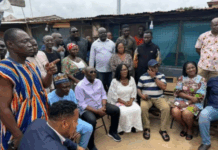The Member of Parliament for Lawra Constituency in the Upper West Region and Deputy Minister designate for Roads and Highways, Mr Anthony Abayefa Karbo, has told the Appointments Committee of Parliament (ACP) that the violent nature tag has nothing to do with his personality.
He said most of the statements reported by the media and attributed to him during the run-up to elections 2012 and 2016 were all blown out of context.
“A lot of the statements were not the actual words from me but the media sometimes made meaning from what I said and tagged it to me,” Mr Karbo said in answering questions about his personality.
Mr Karbo was among three other deputy ministers designate who faced the ACP in the ongoing vetting of government’s appointees.
They were Mr Michael Gyato, a deputy minister designate for Sanitation and Water Resources, and Mr Benito Owusu-Bio, deputy minister designate for Lands and Natural Resources.
Almost all the questions asked Mr Karbo centred on statements he had made during his early years with the New Patriotic Party (NPP).
Mr Karbo said although some of his previous comments were a bit inappropriate, they were never meant to create tension or show any disrespect to individuals to whom those statements were made.
“Looking at things from where I now stand as an MP, I agree to some extent that some of the comments were a bit untimely,” he told the committee.
Answering questions on the role he would play in the Roads and Highways Ministry, Mr Karbo said he would not perform any task outside the directive of his substantive minister.
“I am not going to work alone but with competent people like my minister. I intend to follow and assist him to deliver on his mandate as the Roads and Highways Minister,” he said.
Sanitation and water
The next candidate that faced the ACP was Mr Gyato.
His questions mainly centred on the field he had been appointed to serve.
Asked about what he would bring to the table, Mr Gyato said special attention would be given to issues that hampered Ghana’s quest to attain its sustainable development goals on sanitation.
“Like my minister said when he met the committee, the ministry would implement programmes that would address the sanitation issue in all our cities,” he said.
Realising the importance of sanitation in the development of Ghana, Mr Gyato said the creation of the ministry was an evidence of President Nana Addo Dankwa Akufo-Addo’s determination to properly address the issue of sanitation in Ghana.
“Ghana deserves to have a specific ministry to look properly at the issue of sanitation and water resources,” he added.
On the issue of plastics, Mr Gyato said a ban on plastics might not be the best option considering the fact that most businesses in the country relied on it to operate.
“What the ministry will look into are plans to recycle most of the plastics as companies have started to do. The ministry will offer more help to address the problem,” he added.
Asked what he would do to help address open defecation, he said apart from the World Bank project that sought to support communities and homes to improve on their sanitation, there were plans to ensure “one household, one toilet”.
Lands and natural resources
During his turn, which did not last that long, Mr Owusu-Bio was asked about his plans for the ministry he had been appointed to serve.
He talked about his commitment to support his minister to come up with policies that would address the problem affecting the administration of the country’s land and natural resources.
Mr Owusu-Bio also stressed the need for a proper look into certain areas in land management, saying Ghana needed to protect its lands and natural resources.
He said every single act or move from him would be to assist his minister, adding that he would never show dishonour to his substantive minister because the two of them were not in competition.
source: Daily Graphic






